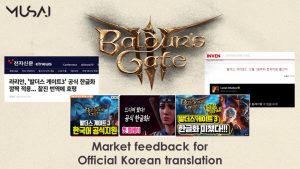[MUSAI] Korean Gamers’ Love Towards Their Language: A Massive Driving Force Shaping Today’s Game Localization Market in Korea
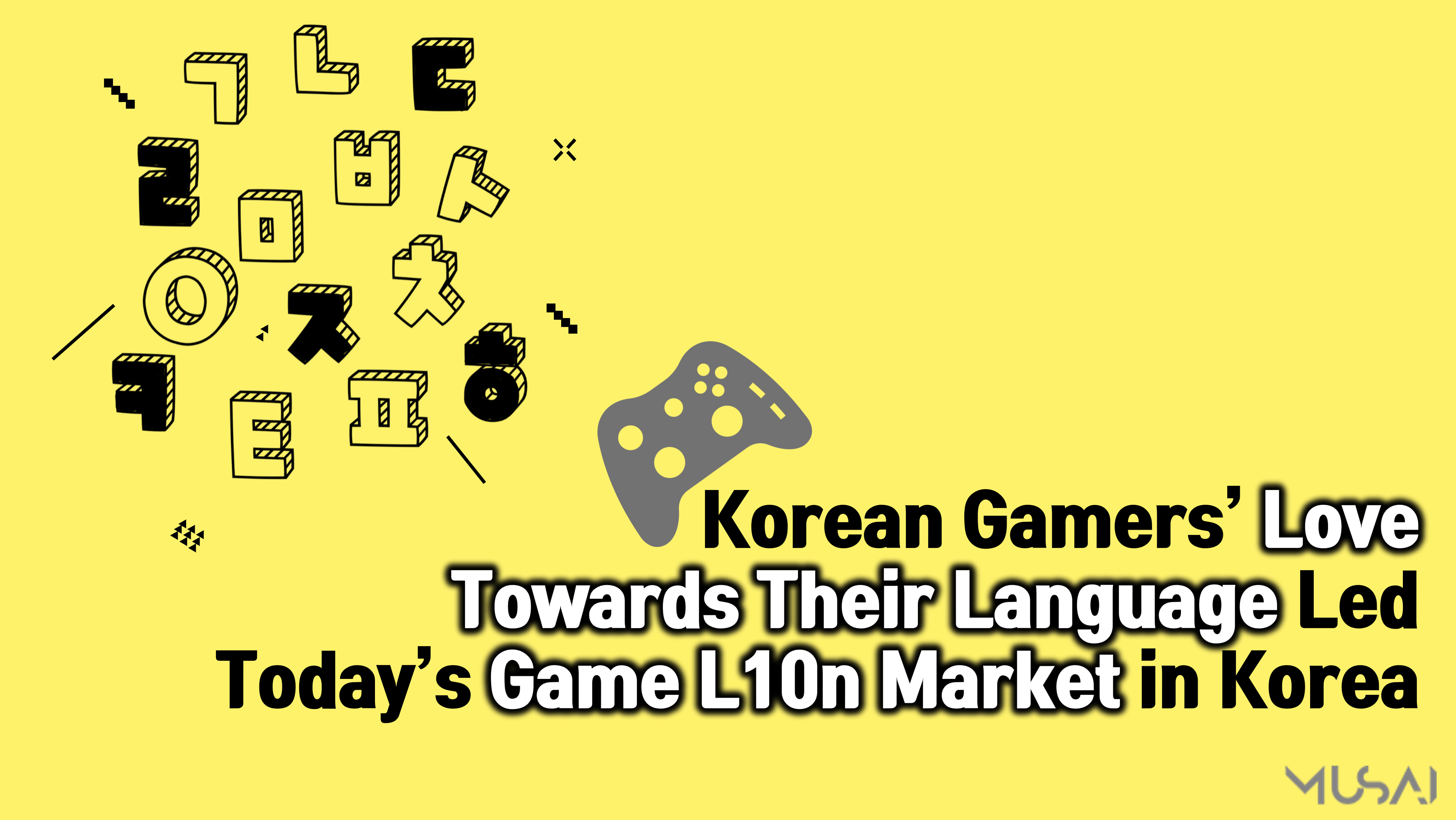
2021-10-06
A well-known game news site in Korea recently posted an interview with an Italian video game publisher that celebrated its 15th anniversary. The article was titled “All our games without exception support the Korean language,” implying that the company is localizing all their published games in Korean because they find the Korean market to be influential.
Over the years, the idea of having a video game localized has changed phenomenally both in and outside of Korea. Most publishers now recognize that proper localization is indeed a requirement to achieve success in the Korean market. Among many other reasons behind this positive change, Korean gamers’ love for Hangul, which is the Korean language, seems to be the main driving force. In celebration of the upcoming Hangul Day, we would like to give an insight into this cultural phenomenon, focusing on Korean gamers and their response towards the localized games in Korean.
The Korean Gamers’ Commitment Paved the Way for the Korean Game Localization Industry
When video game companies from overseas try to enter the Korean market, they go through the process of localization from the source language to Korean. The process is usually referred to as “Hangulwha” and the said term is widely used among domestic gaming websites and communities.
Technically, however, the term “Hangulwha” is not an appropriate expression. An online gamer who has a passionate love for the language had raised a question regarding this issue. According to the National Institute of Korean Language’s answer, the correct expression is “Translated into Korean” or just “Korean.”
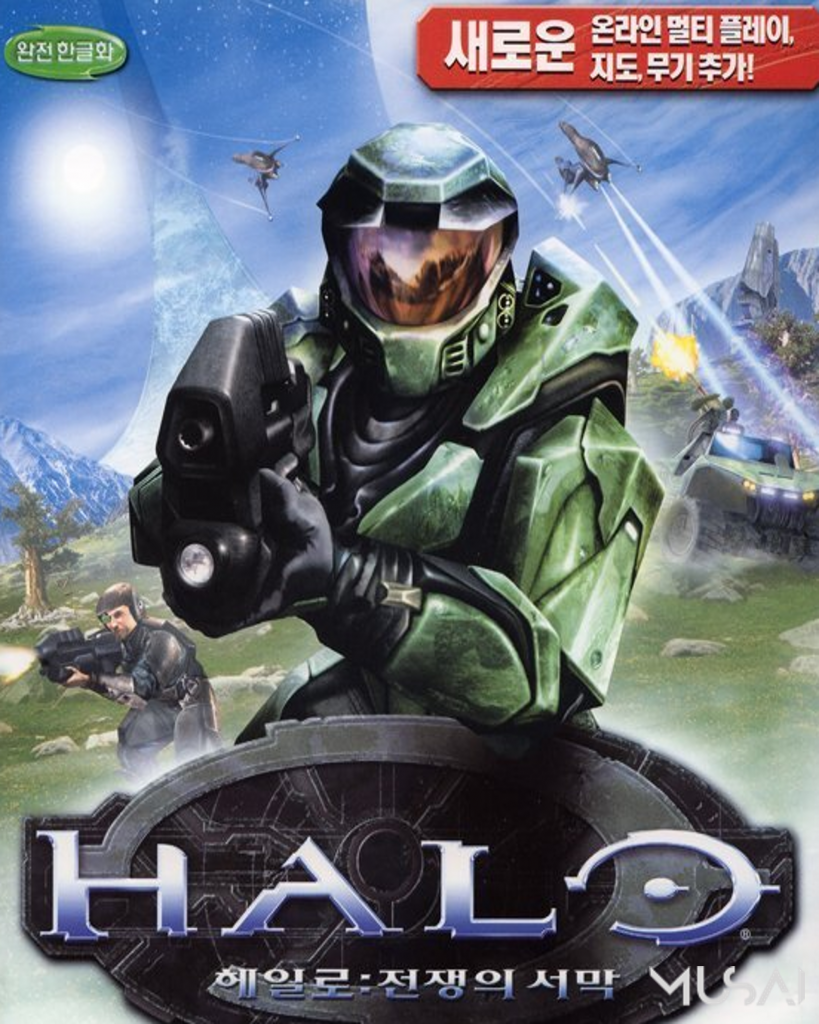
Nevertheless, how “Hangulwha” came to represent the Korean localization of video game software remains unanswered with many theories on various websites and internet communities. The most convincing reason is that it symbolizes the efforts Korean gamers had put into playing video games in their own language when there were so few localized games in the market. They united under the passion for video games, even as to going through reverse engineering themselves, players eventually gave birth to the term “Hangulwha.” It is hard to imagine how committed they were to play their favorite video games in Korean.
From “Hangulwha” to “Localization”: How the Korean Game Localization has been developing
In fact, what gamers want the most would be to play video games that offer an immersive experience with natural localization for both text and audio, regardless of what the process is called. In light of these expectations, the localization quality for recently released video games in Korean has begun to ever improve over time. And this has brought changes to the stances of the users, publishers, LSPs (Language Service Provider) each to their own.
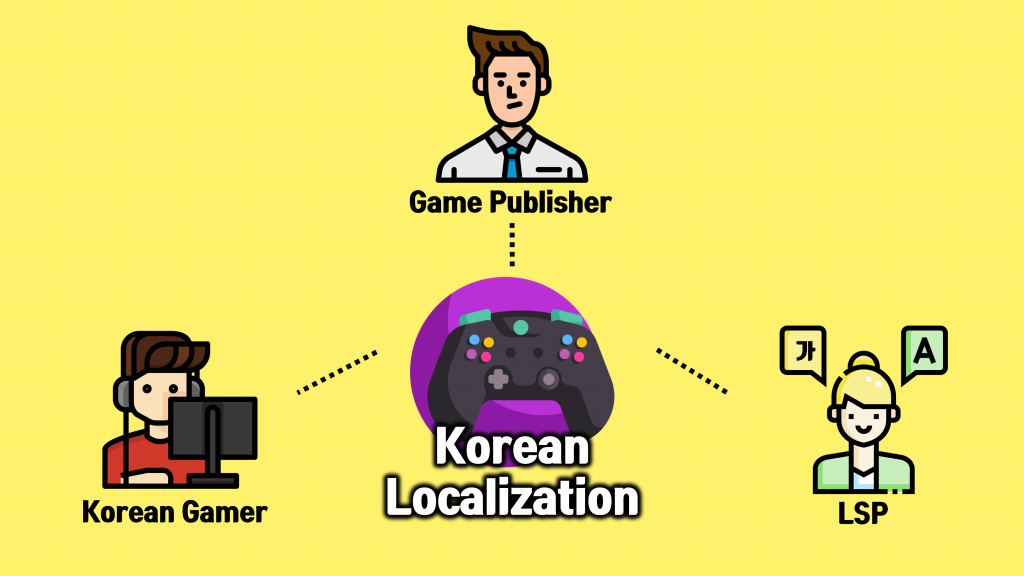
In retrospect, the Korean localization started to see the light back in the early 2000s as more and more titles were released, mostly from major publishers like Microsoft, Blizzard and EA, supporting the Korean language. Only a handful of titles had been released in Korean before then. Since then, major game publishers have actively invested in localizing game titles into Korean, and as the game localization process was established in Korea. The number of professionals working in the localization industry began to increase as well. Be that as it may, the cost for localization had remained a major obstacle, leaving the Korean localization process an option but not a requirement.
Twenty years have passed since, and Korean localization is now considered an essential process. Korean gamers nowadays are ever so used to well-localized titles that they’re even capableu of giving out constructive and high-level criticisms. Gone are the days when players were grateful just to even play anything that was translated into Korean regardless of its quality.
In line with this paradigm, game publishers have also begun to look for competent LSPs with expertise, as localization that falls short of the standard would only bring a bad reputation to the market. The problem is, however, LSPs specializing in games have begun to drop out of the scene. When the demand for video game localization in Korea increased, almost every LSP and recording studio advertised that they were capable of localizing games. As it turned out, sufficient resources for video game localization were hard to come by, and with a lack of understanding of video games and not enough experience to successfully perform given projects, many companies have begun to leave the game localization market for better profit. Now, only a few remain in Korea.
In other words, as the proper “Localization” process replaced user-created “Hangulwha,” quality became the number one priority to survive in the market.
Korean Gamers Prefer Publishers who Consistently Publish “Hangulwha” Titles
As mentioned initially, more and more foreign publishers have begun to recognize the importance of Korean localization and are consistently publishing their games in Korean. With so many games being localized, gamers in Korea now consider “Hangulwha” as a way for publishers to express their love and care for the Korean market, which eventually leads them to the actual purchase of games. The next few cases show how Korean gamers react to publishers that are known for publishing well-localized titles.
Case 1. YBM Sisa
In the early 2000s, YBM Sisa ventured into the video game business and localized titles that exceeded gamers’ expectations. Despite the market’s positive response, the company had to withdraw its business due to the deficit. To this day, many gamers still remember YBM Sisa’s localization works in the industry, which now only remain as a glimpse of the past.
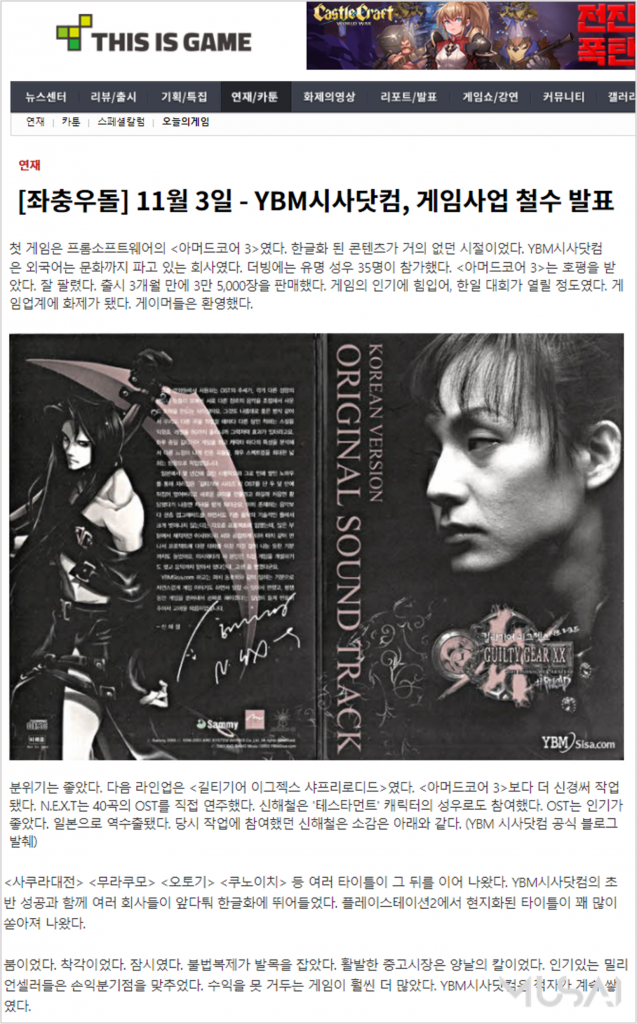
Case 2. UBISOFT
To Korean gamers, UBISOFT is considered “a great company that localizes video game titles often and well.” When UBISOFT was asked in an interview why they’re localizing so many titles even in the less profitable market in Korea, they answered, “Gamers gotta play games!” UBISOFT is now recognized as “a company that values every single gamer.”
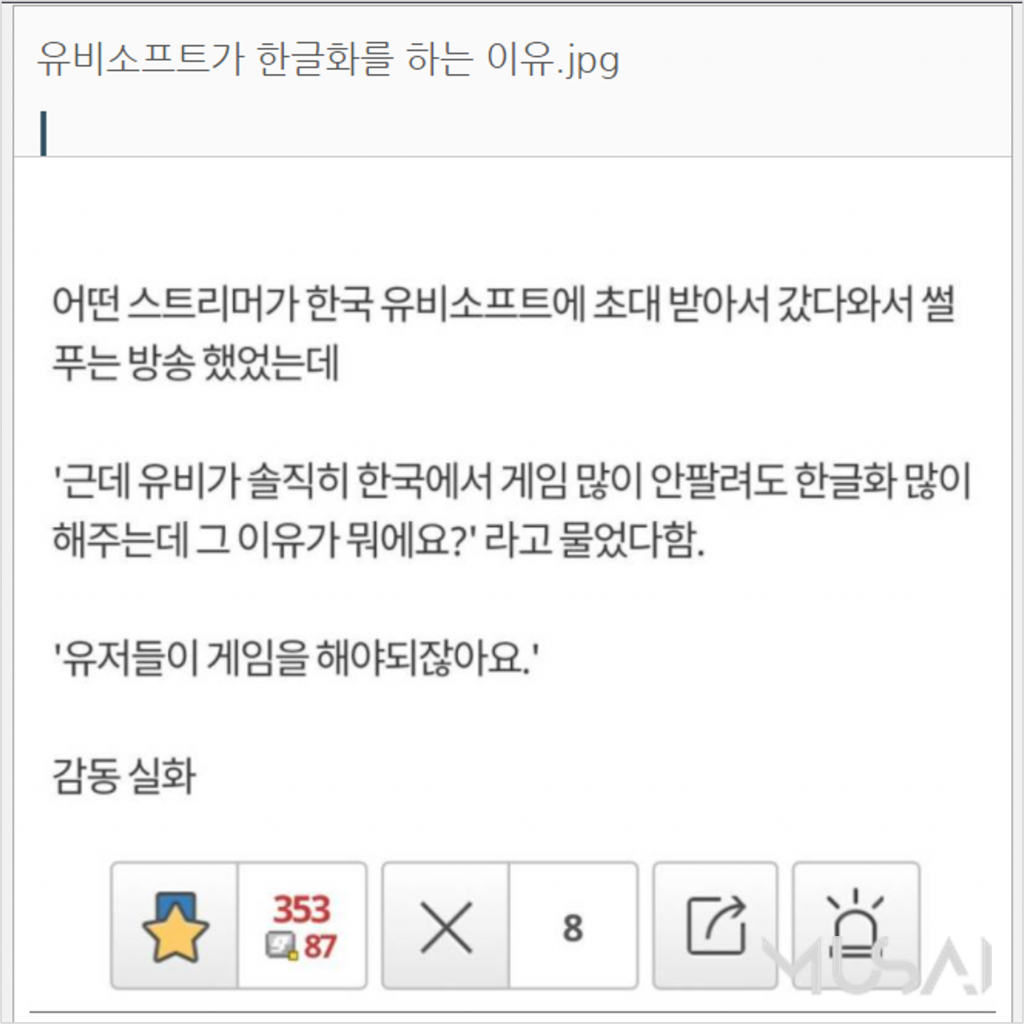
Case 3. Gamer’s active suggestions for the Korean localization
Some express their love for the Korean localization more actively than others. As shown below, they directly request for the localization of titles to game developers or publishers even when said titles are yet to be decided to proceed with the Korean localization or not. Surprisingly, these efforts sometimes lead to the actual localization.
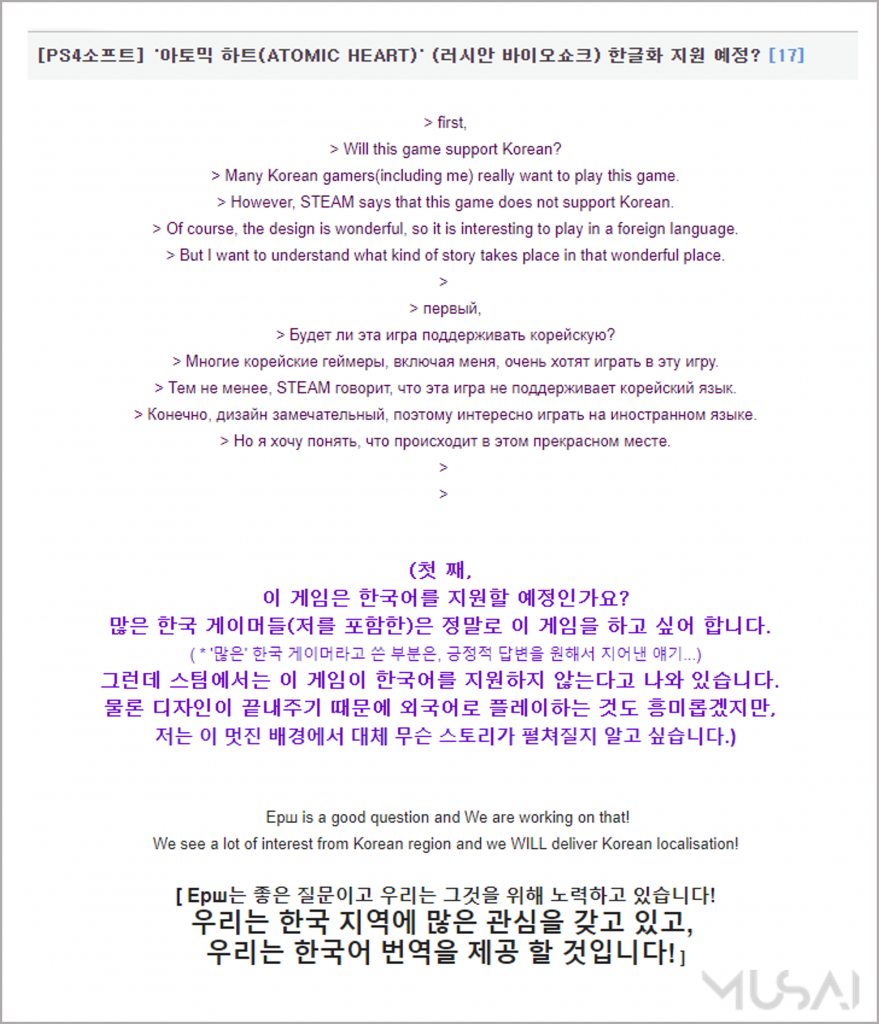
“Korean Voiceover” is Now Essential along with Korean Subtitles!
Although the game translation industry has been growing rapidly, the market for the Korean voiceover still has a long way to go, mainly because there have been fewer projects. Nevertheless, seeing how the game translation market has grown to its current state, gamers are also giving significant interest to the Korean voiceover as well.
Similar to the early game translation market in Korea, gamers in the past were thankful to publishers for showing their interest and support in the Korean market by releasing the Korean dubbed title. That said, recent reactions from users on various media regarding Korean voiceover and direct feedback given to Musai showed a significant change to this paradigm. A lot of the feedback have suggested that an AAA game releasing in Korea should support Korean voiceover, and others have made reasonable criticisms after playing the audio localized titles themselves.
Moreover, as gamers’ interests in voiceover increase, more publishers have begun to localize both text and audio. With voiceover, they expect not only to expand their marketing schemes through advertising the voiceover of the title itself but also to target the fandom of voice talents who actively engage in social media activities.
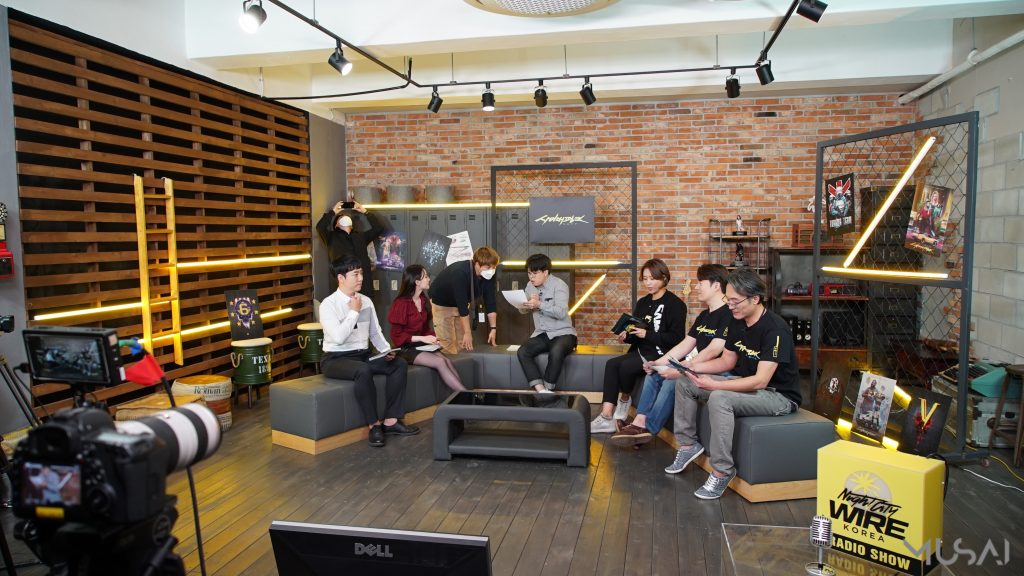
Gamers’ desire and effort to play video games in Korean have set the foundation for “Hangulwha.” They have urged game publishers to make a move and shaped today’s Korean localization market. We at Musai Studio are proud to say that we also have set a great example by improving the overall quality of Korean localization in the market. Reflecting on the localization market growth, we expect the gamer’s demand for Korean localization both text and audio will only go higher from this point on.
In light of these demands, Musai will continue to put the same effort and thought as we did for the past 20 years, if not even more, into offering the best immersive experience. We ask for your continuous interest and support for the Korean localization.
** Did you enjoy the news of Musai? Please click subscribe and share the story.
BOOST YOUR PLAY! Musai Studio





